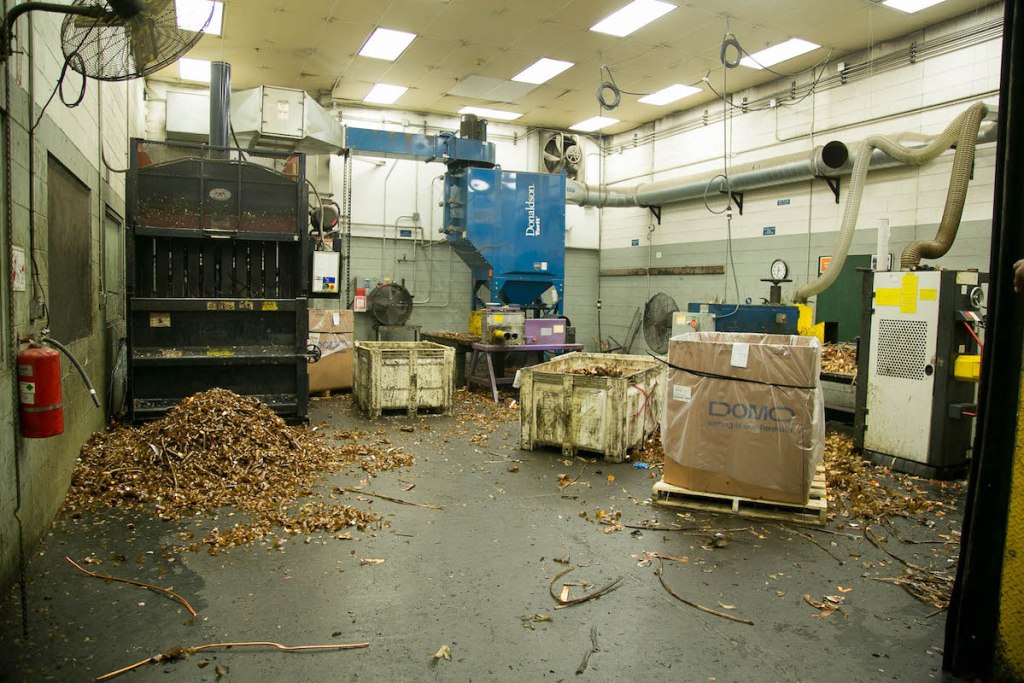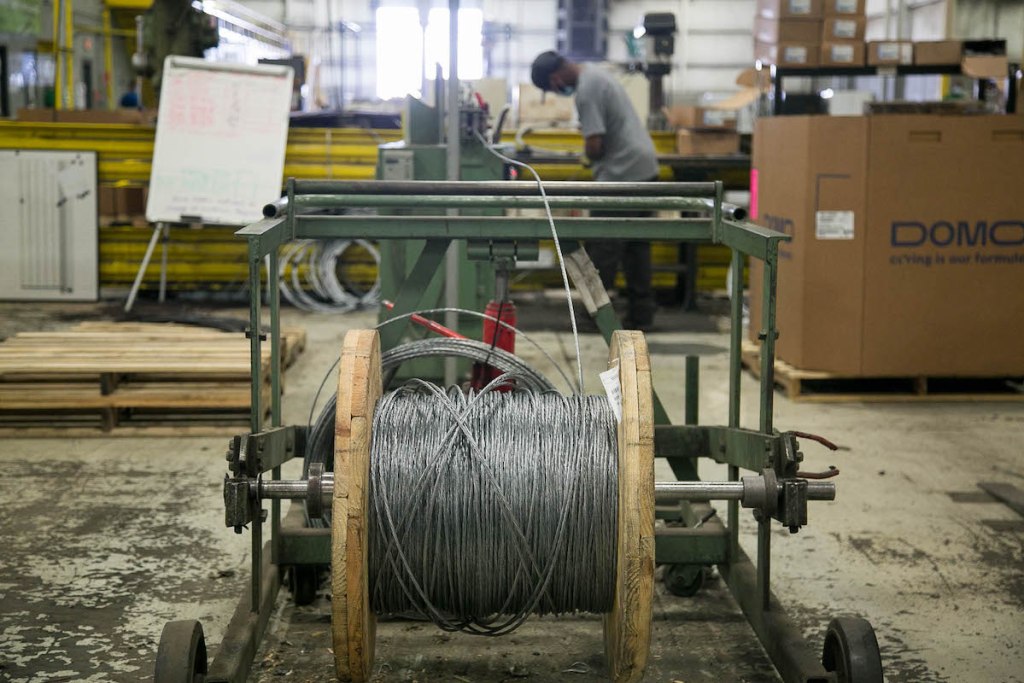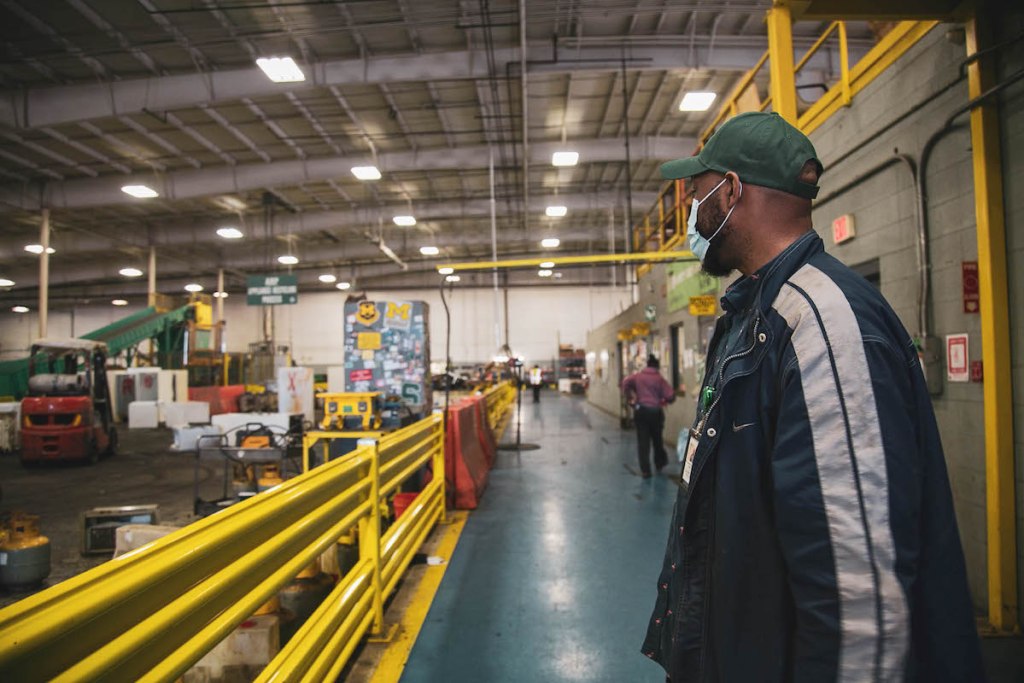Information that's Good to Know
The green economy represents a substantial opportunity for offering solid, well-paying jobs to frontline communities—those most impacted by climate change, with the fewest resources to adapt.
This story was originally published by Planet Detroit as part of a series on just energy futures in Detroit, produced in partnership with Belt Magazine and supported by the Solutions Journalism Network. See all stories in the series here.
Chris Proctor is standing in a warehouse on Detroit’s east side, supervising a gigantic refrigerator crushing machine. The fridge rides up the conveyor belt until it tips into the machine’s maw, where it gets crushed into a metal pancake. Rows of decayed industrial and electrical equipment—copper wiring, spent transformers, old computers—fill the warehouse floor. Proctor’s current job is to oversee the staff that delivers, sorts and extracts high-value metals and other reusable materials, which are then repackaged and resold.
Proctor, who is Black, is a lifelong Detroiter. He grew up on the city’s east side, and recalls his grandmother, who stood in as his main parental figure and who he cites as his main positive influence, breaking up fights between his cousins.
When Proctor was 17 years old, he committed a crime, was sent to jail and emerged four years later in 2001, feeling like life had passed him by. For 10 years he had trouble holding a job. He worked a few years with a moving company, but that was taking a toll on his body. Most other jobs he could get were far out in the suburbs, and he didn’t have a car. His grandmother suggested he reach out to Goodwill. She’d heard about a new program designed to help people who have been formerly incarcerated like Proctor. “By then I had a couple of kids,” Proctor said. “So I’m like, I gotta keep a steady job.”

Copper processing and recovery inside GreenWorks. Credit: Nina Ignaczak
Goodwill sent Proctor to its ”Flip the Script” training program which offers resources to formerly incarcerated people, sometimes known as “returning citizens,” to help them gain a foothold in society. The training includes life skills and job training, anger management, financial counseling, educational remediation and more. Funded primarily by the Michigan Department of Corrections, the program has assisted more than 8,000 people and boasts a completion rate of more than 75% since its inception in 2003.
Once he completed the program in 2010, Proctor went to work for Goodwill’s new GreenWorks, industrial recycling program dedicated to offering jobs to those with barriers to employment. When an assistant plant manager position opened up in 2014, Proctor was interested, but he was worried that he wouldn’t be qualified without a college degree. He knew he had the experience but not the educational credential. He spoke with the company president, who encouraged him to apply. “So they call one day, and he was like, ‘Chris, you’re the new assistant plant manager.’ I was just shocked,” Proctor said. “When I really needed a chance, they gave me a chance.”
Many returning citizens don’t get that chance. Between 2012 and 2017, recidivism—the proportion of incarcerated people who reoffend and return to prison after release—was 71% across 34 states, according to a U.S. Department of Justice report. Nearly half of those returned to prison for violating parole or probation. And the younger a person was upon release, the more likely they were to reoffend and be sent back to prison. Black men are incarcerated and re-incarcerated at disproportionately high rates in the U.S.
In Michigan, the numbers are better. The state’s recidivism rate was 26.7% in 2020, among the lowest in the nation. It peaked at 45.7% in 1998 and has been on the decline ever since. Officials attribute this success to investments in programs and policies designed to improve outcomes for incarcerated people, including jobs and skills training, assistance in getting a driver’s license and completing education and treatment for opioid addiction.
The green economy represents a substantial opportunity for offering solid, well-paying jobs to frontline communities—those most impacted by climate change, with the fewest resources to adapt. That includes communities without education and job skills, including formerly incarcerated people. The Biden administration’s Justice40 initiative, which aims to leverage 40% of federal investments in clean energy and infrastructure in disadvantaged frontline communities, seeks to capitalize on that chance. But its success will depend on its ability to move those investments into those hard-to-reach communities. In that sense, Goodwill’s GreenWorks may serve as a model.
Goodwill Industries first began working with the local utility (Detroit Edison, now known as DTE Energy) during World War II, to harvest metal and steel out of lighting fixtures and units. “So the original problem was a shortage of steel,” Caleb Rutledge, President and CEO at Goodwill GreenWorks, told me. “The whole country was scrambling to find it, and [Detroit Edison] was one of the utilities that were a pioneer in working with workforce development to source it.”
In 2010, DTE Energy decided to outsource its recycling function. So it worked with Goodwill, with whom it already had a rich history of doing business, to spin off a new enterprise: GreenWorks. Operating as a subsidiary under the umbrella of Goodwill Industries of Greater Detroit, GreenWorks opened its 94-thousand-square-foot facility on Detroit’s east side and set about growing the business. DTE Energy accounts for about 60% of GreenWorks’ business, but Rutledge is working to diversify and reduce that proportion to less than half. Today, GreenWorks operates with approximately $2 million a year in gross revenue and employs about a hundred people—virtually all either returning citizens or others with significant barriers to employment such as a lack of work history and education.
GreenWorks appears to be making a difference for formerly incarcerated people. The recidivism rate for GreenWorks clients has ranged between 4 and 10% annually since the program’s inception, a substantial improvement over Michigan’s 26%. The rate has steadily declined with each year of the program’s existence, according to Rutledge.

A GreenWorks worker processes aluminum wire for recovery. Credit: Nina Ignaczak
The GreenWorks model is specifically designed to address the predictable problems faced by returning citizens who are disproportionately Black men and women. Beyond the common lack of education, work history and skills, returning citizens face practical problems like a lack of access to housing, transportation and identification. In addition, they face systemic racism and many carry the trauma that comes with it; many grew up in poverty, witnessed violence in their communities and lacked positive reinforcement and mentorship.
“The reason we’ve been able to have this success is because of the wraparound services that we offer folks while they are working,” Rutledge told me. “…We have true engagement. This isn’t passive engagement. When someone gets kicked out the house and are homeless overnight, and so they don’t show up to work, we’ve taken them to the motel—because there’s a week wait for the placement in one of these housing services. That’s real engagement.”
Goodwill’s formal social service programs help returning citizens with housing and transportation, but for Proctor there’s much more that goes into building trust with returning citizens. He said that for many of the recruits, there’s no substitute for that information and assistance coming from someone who has been in the exact same spot and managed to overcome the barriers. “When you tell them, ‘yeah, I was locked up too’…they feel more comfortable expressing stuff to you,” Proctor told me. “That’s the reason me and the production manager are where we are, because we both have had some trouble in the past. And we both overcame it. And we talk to the guys about some of their trials and tribulations.”
Proctor’s work as plant manager goes beyond supervision. He’s often involved in helping recruits fresh out of jail to reassemble their lives. When one worker revealed he couldn’t read or write, Proctor adapted existing documents to include pictures. “Some people have issues with reading and writing and just comprehending certain things. So we help them [learn to] read and write and get their GED,” he said.
Proctor has seen a lot of folks come and go, as they move on to more lucrative employment opportunities. Many don’t go far, and he keeps in touch. “Most don’t last once they get here, they usually last about a year, year and a half, and some guys are quicker than that,” Proctor told me. “One guy came in last week, and he hadn’t been home for a month. He came in, he worked, got him some confidence about driving the HiLo [forklift], and now he’s making $18.75 somewhere. Once they get that confidence, they’re gone, and they move on to something else.”
Greenworks measures success in terms of its impact on the development and well-being of its workforce, as well as its impact on the environment. It tracks the number of people it trains and retains as employees, and measures proficiency, performance and workplace safety among its workforce. The operation also tracks its environmental impact in terms of the number of pounds of recoverable material it processes. In 2021, GreenWorks processed nine million pounds of ferrous metals, oils, machinery and e-scrap. It has trained and employed more than 900 Detroit residents with employment challenges since its inception in 2010, and says it has operated for the past 18 months without a significant workplace injury. Employees start out at minimum wage and can work their way up to high five-figure salaried positions, as Proctor did.
By filling leadership positions with people like Proctor, who understand these challenges and can model success, the program is better able to reach its employees. Rutledge is working within Goodwill’s national network—it operates in all 50 states—to replicate the model elsewhere.
That work will start this year with Goodwill Industries of Northwest Ohio, where Rutledge will conduct a feasibility study to replicate GreenWorks in the Toledo area. “We can grow workforce development around the country by replicating GreenWorks operations with other Goodwill affiliates,” he said “It’s a great entry-level position into recycling into a green operation.”
A large anchor client, most likely an electric utility, is a necessary ingredient for the GreenWorks model. Rutledge is working with the trade organization Electric Utility Industry Sustainable Supply Chain Alliance to advance the concept, educating electric utilities across the country about how the GreenWorks model can build capacity in communities with barriers to employment, while simultaneously serving the industry. “We’re saying ‘hey, we have a model in Detroit that can be replicated,’” he said. “Energy companies have a presence in every local market.”
Though the potential opportunity is massive, replicating GreenWorks elsewhere will be a big lift. There are many pieces that aligned to make the Detroit model a success—a strong history and relationship with a well-resourced anchor client, a state government intent on advancing criminal justice reform and a network of social services agencies ready to be tapped. But he believes that GreenWorks’ value proposition is solid. “We’re valuable to the industry because we’re shining the light on a revenue stream that they didn’t know was as rich as it is. We actually ‘up’ value, by separating and sorting and bringing more value to those recoverable assets.”
And the revenue generated from recovering these assets, Rutledge said, can simultaneously help rebuild the community. “I see the value add that we bring as a shift of dollars into workforce development programs, while also enabling a greater and higher best use of the material,” Rutledge said. ”It’s being reinvested within the community, within organizations that provide good out here.”
While recycling industrial and electrical equipment may not seem glamorous, it’s an important part of the building of what some are calling the “circular economy” of the future—one in which waste is eliminated, materials are kept in use and natural systems are regenerated. While the municipal, or post-consumer recycling industry today is fraught with problems, recycling high value industrial waste has potential for making a real environmental impact while avoiding environmental harm of improper industrial waste disposal.
Next for GreenWorks is helping to build an entrepreneurial program. They’ve begun experimenting with recovering wood recycling, recruiting folks to learn carpentry skills to produce value-added products. Rutledge sees multiple pathways to employment within the carpentry trades for GreenWorks participants—including apprenticeship, union jobs and entrepreneurship.

Chris Proctor inside GreenWorks. Credit: Nina Ignaczak
As for Proctor, he enjoys his role and bridging the many personalities and characteristics that come through Greenworks. It all hearkens back to his grandmother, to whom he attributes his talent for helping people get along with one another. “She could talk to people. When we would have issues with our cousins, they’d be fighting outside, and she would be able to go out there and talk to them,” Proctor said. “You know, get them to come together and understand that, okay, we’re here for the common good.”
That philosophy of the common good is at the core of Greenworks’ success, Proctor said. It’s about more than just providing a job. It’s about really caring for the workers once they have that job—taking the time and effort to find out what specific needs they may have that may threaten their ability to remain employed, and then engaging with them directly to help fill those needs. Proctor hopes to continue advancing at the organization—he has his sights set on the plant manager position—while launching a heating and cooling business on the side. He also hopes to return to school for a business administration degree.
Rutledge sees the GreenWorks program as a key part of building racial and social equity in the green economy. “We operate as a stepping stone, Our purpose is to provide that initial opportunity into the industry for the constituent base that we serve. They can get a great working record, and then we serve as a stepping stone to that next opportunity. ■
Reporting for this story was funded by a grant from the Solutions Journalism Network.

